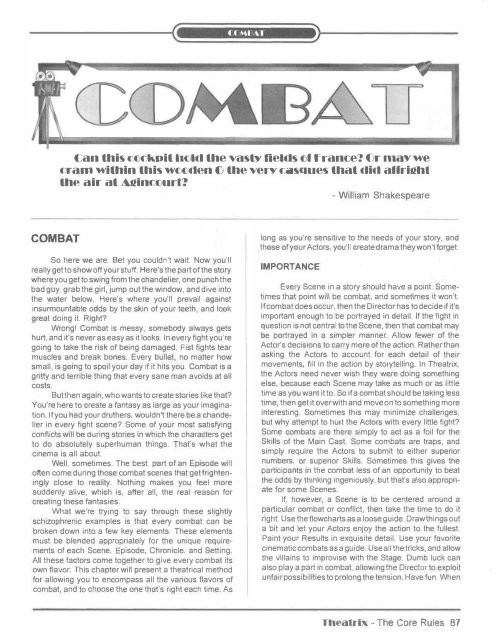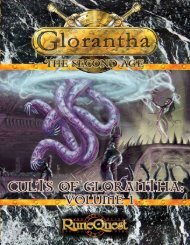Untitled - Index of - Free
Untitled - Index of - Free
Untitled - Index of - Free
Create successful ePaper yourself
Turn your PDF publications into a flip-book with our unique Google optimized e-Paper software.
COMBAT<br />
Can this t:()Ck.Pit ll()ld the vasty fields ()f r=r-ance:! ()r- rna'¥ we<br />
.-:r-am within this W()()den () the verY .-.-asques that did affriuhl<br />
the air at 4.uin£()Urt1<br />
So here we are. Bet you couldn't wait. Now you'll<br />
really get to show <strong>of</strong>f your stuff. Here's the part <strong>of</strong> the story<br />
where you get to swing from the chandelier, one punch the<br />
bad guy, grab the girl, jump out the window, and dive into<br />
the water below. Here's where you'll prevail against<br />
insurmountable odds by the skin <strong>of</strong> your teeth, and look<br />
great doing it. Right?<br />
Wrong! Combat is messy, somebody always gets<br />
hurt, and it's never as easy as it looks. In every fight you're<br />
going to take the risk <strong>of</strong> being damaged. Fist fights tear<br />
muscles and break bones. Every bullet, no matter how<br />
small, is going to spoil your day if it hits you. Combat is a<br />
gritty and terrible thing that every sane man avoids at all<br />
costs.<br />
But then again, who wants to create stories like that?<br />
You're here to create a fantasy as large as your imagina<br />
tion. If you had your druthers, wouldn't there be a chande<br />
lier in every fight scene? Some <strong>of</strong> your most satisfying<br />
conflicts will be during stories in which the characters get<br />
to do absolutely superhuman things. That's what the<br />
cinema is all about.<br />
Well, sometimes. The best part <strong>of</strong> an Episode will<br />
<strong>of</strong>ten come during those combat scenes that get frighten<br />
ingly close to reality. Nothing makes you feel more<br />
suddenly alive, which is, after all, the real reason for<br />
creating these fantasies.<br />
What we're trying to say through these slightly<br />
schizophrenic examples is that every combat can be<br />
broken down into a few key elements. These elements<br />
must be blended appropriately for the unique require<br />
ments <strong>of</strong> each Scene, Episode. Chronicle, and Setting.<br />
All these factors come together to give every combat its<br />
own flavor. This chapter will present a theatrical method<br />
for allowing you to encompass all the various flavors <strong>of</strong><br />
combat, and to choose the one that's right each time. As<br />
- William Shakespeare<br />
long as you're sensitive to the needs <strong>of</strong> your story, and<br />
those <strong>of</strong> your Actors. you'll create drama they won't forget.<br />
IMPORTANCE<br />
Every Scene in a story should have a point Some<br />
times that point will be combat, and sometimes it won't.<br />
If combat does occur, then the Director has to decide if it's<br />
important enough to be portrayed in detail. If the fight in<br />
question is not central to the Scene, then that combat may<br />
be portrayed in a simpler manner. Allow fewer <strong>of</strong> the<br />
Actor's decisions to carry more <strong>of</strong> the action. Rather than<br />
asking the Actors to account for each detail <strong>of</strong> their<br />
movements, fill in the action by storytelling. In Theatnx,<br />
the Actors need never wish they were doing something<br />
else, because each Scene may take as much or as little<br />
time as you want it to. So if a combat should be taking less<br />
time, then get it over with and move on to something more<br />
interesting. Sometimes this may minimize challenges,<br />
but why attempt to hurt the Actors with every little fight?<br />
Some combats are there simply to act as a foil for the<br />
Skills <strong>of</strong> the Main Cast. Some combats are traps, and<br />
simply require the Actors to submit to either superior<br />
numbers, or superior Skills. Sometimes this gives the<br />
participants in the combat less <strong>of</strong> an opportunity to beat<br />
the odds by thinking ingeniously, but that's also appropri<br />
ate for some Scenes.<br />
If, however, a Scene is to be centered around a<br />
particular combat or conflict, then take the time to do it<br />
right. Use the flowcharts as a loose guide. Draw things out<br />
a bit and let your Actors enjoy the action to the fullest<br />
Paint your Results in exquisite detail Use your favorite<br />
cinematic combats as a guide. Use all the tricks, and allow<br />
the villains to improvise with the Stage. Dumb luck can<br />
also play a part in combat, allowing the Director to exploit<br />
unfair possibilities to prolong the tens1on. Have fun. When<br />
Theatrix - The Core Rules 87



